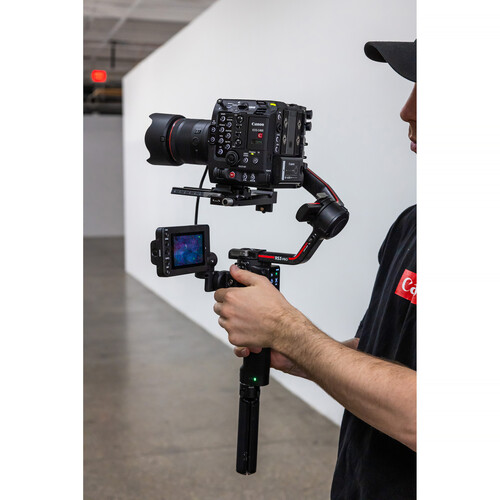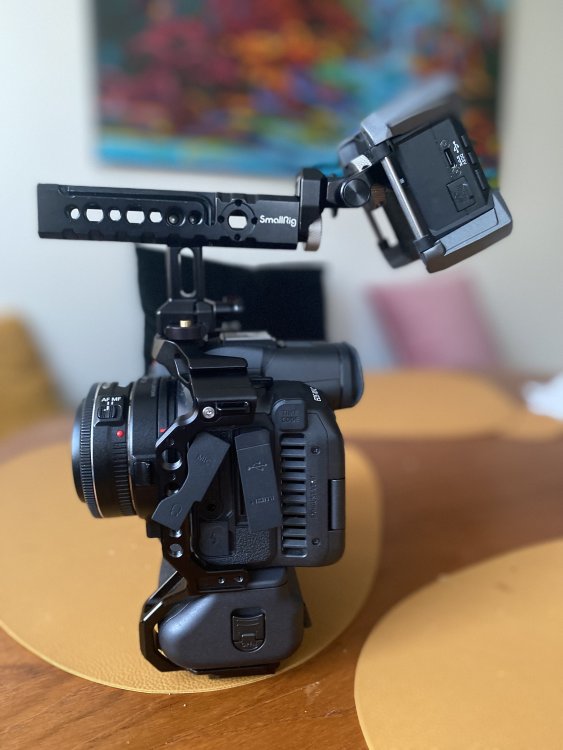-
Posts
454 -
Joined
-
Last visited
Content Type
Profiles
Forums
Articles
Everything posted by Ty Harper
-
I use the Kondor Blue brand which is great but has a 'quirk' in that when you initially connect it, you need to wait 90 secs or more before you actually turn the camera on. It seems like its a safety measure that allows it to acclimate to the R5C's powering needs w/o blowing the circuits (???). But once you've done that you can turn the cam off/on as much as you want - however, if you disconnect the D-tap from the cam for 90 secs or more, you have to repeat the initial process of connecting and waiting 90 secs, again. Aside from that the Kondor Blue brand has been fantastic and I have two of their D-taps now. All that said, I actually no longer use the D-tap/dummy battery option anymore because Canon's new LP-E6P batteries give you 90 mins on a charge and 3 hours with the OEM grip. So I plan to get 4 or 5 of these new batteries which should be able to last an entire shoot. Particularly if you have a basic remote battery charging strategy (like two portable USB-C chargers connected to a powerbank). The other reason I have moved away from D-tap (and USB-C powering for that matter) is there is still a chance that a faulty cord or something can fry/damage your cam. Using LP-E6P batteries guarantees that will never happen. Anyways hope this helps and good luck! https://kondorblue.com/products/d-tap-to-canon-lpe6-dummy-battery-cable?srsltid=AfmBOor5C5INM2K10rRTMNEXPh0WihRDU0zMYj4UPBkMwHmdOKIm-4Uy
-
Haven't seen any tests yet nor have I had time to update to this latest FW myself, but early comments from those who have are suggesting that the updates to the R5C's DIS (#7 below) are really good. If true it would be a fantastic addition to an already amazing cam, imo. "1. Enables functions to be used without limitation in conjunction with the new Battery Pack LP-E6P. This makes it possible to shoot 59.94P with RAW LT. 2. Enables the display of the digital tele-converter icon on [Main Recording Displays] of [DISP Level 2]. 3. Adds the ability to apply Full-Screen display to an external display according to OSD Output setting when using [Peripheral Border Display]. 4. Adds function [Tracking by Touch priority] for starting tracking by touching the LCD. 5. Enables the AF Frame and Focus Guide to be moved by dragging. 6. Adds [Protect Images] and [Rating] during FTP Transfer. (Photo Mode) 7. Adds the [Motion Vector For Digital IS] menu option. Default [Disable]* * [Disable]: Prevents a phenomenon that may cause the image to shake along with the subject when recording a subject (such as a person or an animal) with a large amount movement. 8. Changes the menu option name of [PTP Connection/GP-E2] in [USB Mode] in [System Setup] to [Canon App(s)/GP-E2]. For Android devices, please select [Canon App(s)/GP-E2]. 9. Adds support for the RF-Mount Cinema Lens: CN7x17 KAS T/R1 - Support for Magnification chromatic aberration correction. - Support for Peripheral light correction. - Support for Distortion aberration correction. - Displaying T number. - Enables the remote operation from the camera and RC-V100 (Focus/Zoom/Iris). - Enables the remote operation from Browser Remote (Focus/Zoom/Iris). - Enables the zoom operation by joystick on camera body. - Support for Dual Pixel CMOS AF autofocus. - Support for [Dual Pixel Focus Guide]. - Support for [Push Auto Iris] and [Auto Iris]. 10. Fixes minor issues." https://www.usa.canon.com/support/canon-product-advisories/Firmware-Notice-EOS-R5-C-Firmware-Version-1-0-9-1
-
Haven't seen any tests yet nor have I had time to update to this latest FW myself, but early comments from those who have are suggesting that the updates to the R5C's DIS (#7 below) are really good. If true it would be a fantastic addition to an already amazing cam, imo. "1. Enables functions to be used without limitation in conjunction with the new Battery Pack LP-E6P. This makes it possible to shoot 59.94P with RAW LT. 2. Enables the display of the digital tele-converter icon on [Main Recording Displays] of [DISP Level 2]. 3. Adds the ability to apply Full-Screen display to an external display according to OSD Output setting when using [Peripheral Border Display]. 4. Adds function [Tracking by Touch priority] for starting tracking by touching the LCD. 5. Enables the AF Frame and Focus Guide to be moved by dragging. 6. Adds [Protect Images] and [Rating] during FTP Transfer. (Photo Mode) 7. Adds the [Motion Vector For Digital IS] menu option. Default [Disable]* * [Disable]: Prevents a phenomenon that may cause the image to shake along with the subject when recording a subject (such as a person or an animal) with a large amount movement. 8. Changes the menu option name of [PTP Connection/GP-E2] in [USB Mode] in [System Setup] to [Canon App(s)/GP-E2]. For Android devices, please select [Canon App(s)/GP-E2]. 9. Adds support for the RF-Mount Cinema Lens: CN7x17 KAS T/R1 - Support for Magnification chromatic aberration correction. - Support for Peripheral light correction. - Support for Distortion aberration correction. - Displaying T number. - Enables the remote operation from the camera and RC-V100 (Focus/Zoom/Iris). - Enables the remote operation from Browser Remote (Focus/Zoom/Iris). - Enables the zoom operation by joystick on camera body. - Support for Dual Pixel CMOS AF autofocus. - Support for [Dual Pixel Focus Guide]. - Support for [Push Auto Iris] and [Auto Iris]. 10. Fixes minor issues." https://www.usa.canon.com/support/canon-product-advisories/Firmware-Notice-EOS-R5-C-Firmware-Version-1-0-9-1
-
The S9 was high on my list of cams to get for a passion project that's taking me overseas - but at $2K, and me actually needing a C-cam to complement my R5C's, it just wasn't in the cards - but it def looks like a great option for anyone looking for something compact.
-
With the LP-E6P batteries you now get 1hr 30 mins with one batt and 3 hours with the grip. Obvi not the best out there, but unless you need more than three hours, you no longer need external power solutions and rigging heavier than adding a grip. That said the R5 continues to be a great option and as someone with two R5Cs, I am seriously considering purchasing the R5 a second time as my C/travel cam, for some of the reasons you pointed out - not to mention that used prices on the R5 are approaching used R6 MKII prices.
-
These are all pretty fair assessments - and of course we all have different pros/cons based on our shooting needs. As someone who has been using the R5C for several years now, and now has two of them, I can say that the switching from video to pics is not that big of a deal after a FW update that reduced the switch over time to under 5 seconds. So if that practical difference of maaaybe 2 seconds (compared to an R5 or other hybrid cams) is of absolute critical importance - compared to all the things you gain with the R5C's feature set - and if JPEG isn't enough, then yes, it isn't the cam for you. Also, if I'm not mistaken, you can be in 8K RAW video mode AND still shoot RAW pics. You don't have to extract stills from the video. As far as image stab goes, I initially bought an R5 bcuz I thought I needed IBIS, and honestly, after about 6 months using both cams together, I didn't feel like the gains of the R5's IBIS were enough for me to keep it - so I sold it and got my second R5C. For my use cases the R5C's DIS in tandem with lens IS is perfect for my needs. And again, losing IBIS was offset by all the cot damn features you get with the R5C. The only thing I miss with the R5 is the little extra compactness it gives you by not having a fan AND the fact that you cannot adjust the internal mics on the R5C, at all. These factors are why I'm currently considering picking up and R7/5/6 MKII for a passion project I'm shooting overseas next year. Bcuz the R5C's fan + the need to have a small shotgun mic for usable audio, means I'll stick out like a sore thumb way more if I bring it with me, altho that Sennheiser MKE 200 might low pro/compact enough for me to just stick with one of my R5C. All that to say, the R5C feels to me like a final destination, future proof cam. And while I still need to decide what my C-Cam will be, I won't be surprised if I just make it another R5C and call it day.
-
Totally - which is why I stay away from using the hdmi and even USB-C ports on my two R5Cs. I'm mostly a hobbyist and can't afford to spend 1K USD every time those ports go.
-
Absolutely! Although I see them as serving two slightly different hybrid users: the cinema/photo shooter and the all round video/photo shooter. On another note, if the R5C ends up being a one-off release, it will be Canon's unicorn cam when it comes to the sheer amount of features packed into its mirrorless styled body. Kind of the way the 1DC was a one-off with an image that made it kind of a unicorn amongst DSLRs.
-
Wow, so looks like a new FW update in December will allow the R5C to do 8k 60p RAW with no external power and JUST the LP-E6P battery: https://www.canon.co.uk/press-centre/press-releases/2024/11/firmware-updates-add-extensive-new-functionalities-to-canon-professional-video-cameras/
-

Camera advice. What after a EOS R? (and a RicohGR)
Ty Harper replied to tomastancredi's topic in Cameras
Mmm, maybe the Fujifilm XT-4 or 5 or X100 XI, or the Panasonic S9? -
El Zone is apparently included as well
-
Wow, so Matthew Allard over at Newsshooter is reporting that the Shinobi MKII will have a new FW update that allows it to do touch focus AF with the Canon R6 MKII (among other non-Canon cameras). The R5C is not on the list yet, but this all seems promising. Here's an excerpt from the original Atomos press release: "At IBC, Atomos (Hall 11, D25) announces major new functionality for Shinobi II, the amazingly successful Photo | Video Monitor. Users get a world’s first: on-monitor touch auto focus and focus subject tracking, in both photo and video camera modes, and it’s a free update for all existing users. The first camera models to be supported are from Sony (A7 MkIV), Canon (R6 Mark II), Panasonic (S5 II) and Fujifilm (GFX100 II). Nikon is also now supported for photo and video modes, with auto focus and focus subject tracking to follow in future updates." Sorry if this has already been posted but don't recall seeing it.
-
Wow, so Matthew Allard over at Newsshooter is reporting that the Shinobi MKII will have a new FW update that allows it to do touch focus AF with the Canon R6 MKII (among other non-Canon cameras). No other Canon cam is on the list yet, but this all seems promising. Here's an excerpt from the original Atomos press release: "At IBC, Atomos (Hall 11, D25) announces major new functionality for Shinobi II, the amazingly successful Photo | Video Monitor. Users get a world’s first: on-monitor touch auto focus and focus subject tracking, in both photo and video camera modes, and it’s a free update for all existing users. The first camera models to be supported are from Sony (A7 MkIV), Canon (R6 Mark II), Panasonic (S5 II) and Fujifilm (GFX100 II). Nikon is also now supported for photo and video modes, with auto focus and focus subject tracking to follow in future updates." Sorry if this has already been posted but don't recall seeing it.
-
Wow, so Matthew Allard over at Newsshooter is reporting that the Shinobi MKII will have a new FW update that allows it to do touch focus AF with the Canon R6 MKII (among other non-Canon cameras). No other Canon cam is on the list yet, but this all seems promising. Here's an excerpt from the original Atomos press release: "At IBC, Atomos (Hall 11, D25) announces major new functionality for Shinobi II, the amazingly successful Photo | Video Monitor. Users get a world’s first: on-monitor touch auto focus and focus subject tracking, in both photo and video camera modes, and it’s a free update for all existing users. The first camera models to be supported are from Sony (A7 MkIV), Canon (R6 Mark II), Panasonic (S5 II) and Fujifilm (GFX100 II). Nikon is also now supported for photo and video modes, with auto focus and focus subject tracking to follow in future updates." Sorry if this has already been posted but don't recall seeing it.
-
Film, vinyl, cassettes, etc - these formats were never gone. They just fell out of relevance with the 'mainstream' consumer and became 'niche'.
-
On a random reddit thread. Again totally a rumour, but it doesn't seem far fetched to think that Zoom would counter such a direct competitor to their F3 by either offering a FW update of some sort or an MKII. However, I'm not sure what FW update(s) they could offer that would make the F3 a more competitive option than the FR-AV2.
-
Zoom has been pretty good with the FW updates so fingers crossed all of this competition gets them to throw the OG Zoom F3 owners a bone or two.
-
There are also rumors of a Zoom F3 MKII on the way - so thinking I might also wait to see if that's true!
-
@IronFilmyou seen this?
-
Yeah, feels like the only thing left to know is maybe how good the pre-amps are?
-
Looks promising! https://tascam.com//us/product/fr-av2 https://www.bhphotovideo.com/c/product/1852610-REG/tascam_fr_av2_32_bit_float_recorder_timecode_generator.html
-
Maybe the Canon R7?
-
With Canon's new C400 shipping with a brand new detachable USB-C based monitor, I've been musing on whether it might be compatible with the R5C with a firmware update, similar to what Canon did to make the C200's LM-V1 monitor compatible with the C300 MKII. As far as the technical side goes, it seems like both the R5C and C400 have the exact same USB-C 3.2 Gen 1 port. Also, I did not know this but page 123 of the R5C's video manual seems to confirm that it can output a max 8K 30p resolution via its USB-C port. I also made a call to Canon USA tech support, and while the person could not confirm that the C400's monitor would be made compatible with the R5C, they did not outright deny that is was technically impossible. Now obviously I can't be sure the person I spoke to was a reliable source. I also think there might be a chance that while the R5C and the C400 have the same USB-C port, that the amount of power they can support might be different. All that said, it seems like there is a chance that at least technically speaking the C400's monitor (along with its coveted touch screen AF features) could be compatible with the R5C, which imo would be a fantastic addition to its feature set. Particularly for gimbal use. I've included a pic of the C400 with its monitor attached to an RS3 Pro to demonstrate what I'm getting at! Anyways, it would be great if the more tech savvy amongsr use could do their own digging to see if this is indeed true. But either way it probably wouldn't hurt to nudge Canon so at the very least they know there is demand for such a firmware update from R5C and maybe even C70 owners (altho I'm not sure if the C70 has the same USB-C port).
-
Yes the micro-hdmi port on the R5C is horrible. When I need to use a monitor I use either the Smallrig or Canon OEM port protector in tandem with the Smallrig's micro to full hdmi adapter. Aa far as pancake lens options, yes, the 24mm EF-S f2.8 would be your other option, or the 40mm pancake in tandem with Canon's 0.71x speedbooster which I use with the R5C in its s35 mode and is such a great piece of kit to have, and I imagine would be an even greater accessory for the C70 if you don't have it already.
-





